#Solomon Epstein
Text
British billionaire Lord Sugar rips remote work while Zooming in—but he may have a point about mentorship | Fortune
British billionaire Lord Sugar rips remote work—while Zooming in from off-site. But he may have a point that it’s ‘bad for morale, bad for learning’
In a remote interview, the host of the UK version of "The Apprenctice" said no one learns “sitting at home in your pajamas.”
BY JANE THIER
February 05, 2024 2:17 PM EST
“You don’t learn sitting at home in your pajamas,” the entrepreneur and host of the U.K.’s “The Apprentice” said. Don Arnold—WireImage/Getty Images
Lord Alan Sugar hates remote work so much he calls in remotely to the BBC to complain about it.
The British billionaire went viral on TikTok for espousing his anti-remote-work views from the comfort of a remote office—but work experts have agreed with much of what he’s saying.
“You don’t learn sitting at home in your pajamas,” the entrepreneur and host of the U.K.’s The Apprentice said. The interview, conducted last week, was part of Sugar’s press tour following the 18th season premiere of The Apprentice. “I’m totally against it, quite frankly. I think it’s bad for morale, bad for learning. I know I learn from being with other people in an office.”
While Sugar has taken a more incendiary stance than most, his opinions are hardly unpopular—especially among older, more established businesspeople.
Citadel CEO Ken Griffin said that failing to work in person is a “grave mistake” and could make it easier for your boss to fire you, since they’re unlikely to know you personally. Goldman Sachs CEO David Solomon called remote work an “aberration,” and JPMorgan Chase’s Jamie Dimon said remote workers at his bank should probably work elsewhere, while Tesla’s Elon Musk took it a step further, saying remote employees are simply pretending to work...."
Can we yeet these selfish mofos, into the Sun? The wealth class in Britain is ALL TRASH. 'LORD Sugar'. JP Morgan regularly involves itself in such things as Trafficking (Epstein) Psyops against America (one of the people involved in QANON, worked at JP Morgan). Goldman Sachs is barely legitimate, itself. And we all know how destructive Apartheid Clyde has been. California shouldn't forget how he cost the state its planned Train system, over an Electric Vehicle stunt.
They want their portfolios to stay up, their physical footprint to block land, and most importantly, to use employees for various manipulations. Work Harassment and Psychological Games come to mind. The negative shit people deal with in an office atmosphere. I really think it's all about Control.
As an FYI, if people really think these men are not inherently evil, just remember the type of films we've been getting lately; most, financed by Wall Street. So much Psychological Horror, Underage Sexual themes, and Hyperviolence. Fight for your right to Remote Work!
#The Apprentice#Lord Sugar#UK#JP Morgan#Jamie Dimon#Jeffrey Epstein#QANON#Goldman Sachs#David Solomon#Citadel#Ken Griffin#Tesla#Neuralink#Disney Company#Twitter#Elon Musk#Remote Work#WE HAVE A SERIOUS BILLIONAIRE BLIGHT INTERFERING WITH THE ABILITY TO HAVE A LIFE!#Fortune Magazine#Fucking Hypocrites
0 notes
Text
2023 Books Read
Our Wives Under the Sea - Julia Armfield (Dec 31-Jan 2)
See You Yesterday - Rachel Lynn Solomon (Jan 2-Jan 3)
All Dressed Up - Jilly Gagnon (Jan 4)
She Gets the Girl - Rachael Lippincott & Alyson Derrick (Jan 5-Jan 6)
Ready Player One - Ernest Cline (Jan 6-Jan 10)
Jamaica Inn - Daphne Du Maurier (Jan 10-Jan 13)
Greywaren - Maggie Stiefvater (Jan 14-Jan 16)
The Ballad of Never After - Stephanie Garber (Jan 17-Jan 22)
By the Book - Jasmine Guillory (Jan 22-Jan 24)
Portrait of a Thief - Grace D Li (Jan 25-Feb 4)
Pride and Prejudice (reread, audiobook) - Jane Austen (Jan 31-Feb 6)
Macbeth (reread) - William Shakespeare (Feb 6-Feb 10)
Normal People - Sally Rooney (Feb 18-Feb 22)
All the Dangerous Things - Stacy Willingham (Feb 23-Feb 25)
The Diary of Mary Berg - Mary Berg (Feb 17-Feb 27)
The Witch Haven - Sasha Peyton Smith (Mar 4-Mar 11)
Americanah - Chimamanda Ngozi Adichie (Feb 26-Mar 12)
The Witch Hunt - Sasha Peyton Smith (Mar 19-Mar 22)
Jonny Appleseed - Joshua Whitehead (Mar 19-Mar 28)
The Mysterious Affair at Styles - Agatha Christie (Mar 25-Mar 29)
Last Violent Call - Chloe Gong (Mar 30-Apr 1)
Beartown - Fredrik Backman (Apr 1-Apr 4)
People We Meet on Vacation (reread) - Emily Henry (Apr 5-Apr 7)
Notes on an Execution - Danya Kukafka (Apr 8)
Kiss Her Once For Me - Alison Cochran (Apr 8-Apr 10)
If You Could See the Sun - Ann Liang (Apr 11-Apr 15)
Murder at the Vicarage - Agatha Christie (Apr 15-Apr 19)
The Appeal - Janice Hallett (Apr 19-Apr 20)
The Black Spider - Jeremias Gotthelf (Apr 20)
Molly of the Mall - Heidi L.M. Jacobs (Apr 21-Apr 22)
The Dark Descent of Elizabeth Frankenstein - Kiersten White (April 23-Apr 25)
Sense and Sensibility - Jane Austen (April 26-Apr 28)
Happy Place - Emily Henry (Apr 29)
Us Against You - Fredrik Backman (Apr 30-May 3)
The Great Gatsby - F. Scott Fitzgerald (May 3-May 5)
Juniper and Thorn - Ava Reid (May 6-May 10)
Meet Me at the Lake - Carley Fortune (May 11-May 12)
Cloud Atlas - David Mitchell (May 12-May 19)
Anne of Green Gables (reread) - L.M. Montgomery (May 19-May 22)
Anne of Avonlea (reread) - L.M. Montgomery (May 24-May 26)
Anne of the Island (reread) - L.M. Montgomery (May 26-May 30)
The Winners - Fredrik Backman (June 2-June 6)
Rebecca - Daphne Du Maurier (June 7-June 8)
Peril at End House - Agatha Christie (June 9)
The Many Lives and Secret Sorrows of Josephine B (reread) - Sandra Gulland (June 11-June 12)
Tales of Passion Tales of Woe - Sandra Gulland (June 13-June 14)
The Last Great Dance on Earth - Sandra Gulland (June 14-June 15)
Frankenstein in Baghdad - Ahmed Saadawi (June 15-June 18)
Crooked House - Agatha Christie (June 22-June 24)
Northanger Abbey - Jane Austen (June 20-June 30)
I Must Betray You - Ruta Sepetys (June 30-July 1)
Pageboy - Elliot Page (July 2-July 4)
This Time It’s Real - Ann Liang (July 6)
The Last Word - Taylor Adams (July 6-July 7)
The Fiancée Farce - Alexandria Bellefleur (July 7-July 8)
The Guilt Trip - Sandie Jones (July 8)
Camp Zero - Michelle Min Sterling (July 8)
The Berry Pickers - Amanda Peters (July 8-July 9)
Family of Liars - E. Lockhart (July 9-July 11)
The Last House Guest - Megan Miranda (July 11-July 12)
The Last Tale of the Flower Bride - Roshani Chokshi (July 14-July 21)
Rolling in the Deep (audiobook) - Mira Grant (July 20-July 21)
Wunderland - Jennifer Cody Epstein (July 21-July 23)
The Stationary Shop of Tehran (July 24-27)
Yellowface - R.F. Kuang (July 27-July 29)
These Violent Delights - Micah Nemerever (July 29-Aug 3)
Wuthering Heights - Emily Brontë (Aug 3-Aug 5)
Begin Again - Emma Lord (Aug 6-Aug 8)
Medicine Walk - Richard Wagamese (Aug 8-Aug 12)
419 - Will Ferguson (Aug 16-Aug 19)
Harlem Shuffle - Colson Whitehead (Aug 21-Aug 24)
Ballet Shoes (reread) - Noel Streatfeild (Aug 25-Aug 26)
Songs for the Missing - Stewart O’Nan (Aug 28-Aug 31)
You’re Not Supposed to Die Tonight - Kalynn Bayron (Sept 1-Sept 2)
I’ve Got Your Number - Sophie Kinsella (Sept 2)
The Adult - Bronwyn Fischer (Sept 3)
Nine Liars - Maureen Johnson (Sept 4-Sept 6)
Small Things Like These - Claire Keegan (Sept 6)
The Honeys - Ryan La Sala (Sept 15-Sept 19)
20,000 Leagues Under the Sea - Jules Verne (Sept 12-Sept 20)
Beowulf - Unknown (Sept 8-Sept 21)
The Mirror Crack’d From Side to Side - Agatha Christie (Sept 21-Sept 25)
Better Than the Movies - Lynn Painter (Sept 26-Sept 30)
Annihilation - Jeff VanderMeer (Oct 4-Oct 7)
And Don’t Look Back - Rebecca Barrow (Oct 7)
Hallowe’en Party - Agatha Christie (Oct 8-Oct 9)
Cannibal Island - Nichlolas Werth (Oct 9-Oct 22)
The Final Gambit - Jennifer Lynn Barnes (Oct 17-Oct 22)
Stalin’s Nomads: Power and Famine in Kazakhstan - Robert Kindler (Oct 16-Oct 24)
Six of Crows (reread) - Leigh Bardugo (Oct 25-Oct 30)
Crooked Kingdom (reread) - Leigh Bardugo (Nov 3-Nov 7)
Sadie (reread) - Courtney Summers (Nov 9-Nov 10)
The Invisible Man - H.G. Wells (Nov 6-Nov 13)
Hamlet - William Shakespeare (Nov 6-Nov 13)
A Good Girl’s Guide to Murder (reread) - Holly Jackson (Nov 11-Nov 15)
Good Girl, Bad Blood (reread) - Holly Jackson (Nov 15-Nov 18)
As Good as Dead (reread) - Holly Jackson (Nov 20-Nov 23)
Red White and Royal Blue (reread) - Casey McQuiston (Nov 25-Dec 5)
The Secret History - Donna Tartt (Dec 18-Dec 22)
The Day of the Jackal - Frederick Forsyth (Dec 24-Dec 25)
Emily Wilde’s Encyclopaedia of Faeries - Heather Fawcett (Dec 25-Dec 27)
Murder in the Family - Cara Hunter (Dec 28)
Three Holidays and a Wedding - Uzma Jalaluddin, Marissa Stapley (Dec 29)
The Book of Cold Cases - Simone St James (Dec 30-Dec 31)
73 notes
·
View notes
Text
April reads
The Free People’s Village by Sim Kern
Burning Girls and Other Stories by Veronica Schanoes
Belonging: A German Reckons with History and Home by Nora Krug
I Was Their American Dream: A Graphic Memoir by Malaka Gharib
That Summer Feeling by Bridget Morrissey
Be Gay, Do Comics: Queer History, Memoir, and Satire From The Nib edited by Matt Bors and Mattie Lubchansky
Greta & Valdin by Rebecca K Reilly
Eat the Rich by Sarah Gailey, Pius Bak, and Roman Titov
A Tip for the Hangman by Allison Epstein
The Earth in the Attic by Fady Joudah
Business or Pleasure by Rachel Lynn Solomon
Sailor’s Delight by Rose Lerner
Rosaline Palmer Takes the Cake by Alexis Hall
Something Wild and Wonderful by Anita Kelly
These Fragile Graces, This Fugitive Heart by Izzy Wasserstein
[Title unspecified for SMP boycott]
The Haunting of Heatherhurst Hall by Sebastian Nothwell
The Táin: The Woman’s Stories by Karina Tynan
Hard Sell by Hudson Lin
Tripping Arcadia by Kit Mayquist
Her First Palestinian by Saeed Teebi
Just Lizzie by Karen Wilfrid
Empire of the Fesst by Bendi Barrett
Men I Trust by Tommi Parrish
5 notes
·
View notes
Text
THIS DAY IN GAY HISTORY
based on: The White Crane Institute's 'Gay Wisdom', Gay Birthdays, Gay For Today, Famous GLBT, glbt-Gay Encylopedia, Today in Gay History, Wikipedia, and more … January 31


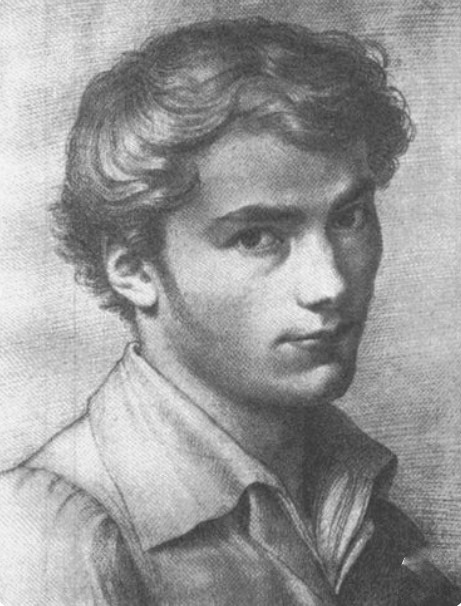
1797 – Austrian composer Franz Schubert was born (d.1828). He wrote some six hundred Lieder, nine symphonies (including the famous "Unfinished Symphony"), liturgical music, operas and a large body of chamber and solo piano music. He is particularly noted for original melodic and harmonic writing.
While Schubert had a close circle of friends and associates who admired his work (including his teacher Antonio Salieri and the prominent singer Johann Michael Vogl), wider appreciation of his music during his lifetime was limited at best. He was never able to secure adequate permanent employment, and for most of his career he relied on the support of friends and family. Interest in Schubert's work increased dramatically in the decades following his death.
Schubert was significantly influenced by his close-knit group of male friends, known as the Schubert Circle. His relationships with an older school friend Joseph von Spaun, the young poet Johann Mayrhofer, and the wealthy young sensualist Franz von Schober were the most important of his life. He and Schober often lived together for extended periods.
Citing the composer's dissipation, his lack of female love interests, his passionate male friendships and several oblique references in his surviving correspondence, Maynard Solomon has argued that Schubert's primary erotic orientation was homosexual. The immediate reaction on the part of many musicologists and music critics, who often simply refused to consider the evidence, revealed a deep-seated homophobia among many specialists in classical music. But in recent years the notion of a gay Schubert has become if not commonplace, at least much less controversial. Schubert's alleged homosexuality and its effect on his music are subjects of continuing debate among music historians and critics.

1727 – A Prussian baker is executed for fellating another man who later died, according to the court, of "exhaustion." 🤣🤣🤣

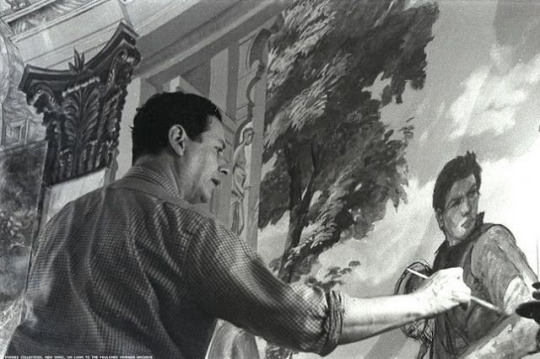
1914 – Edward Melcarth (d.1973) was a painter, sculptor, illustrator, lecturer and teacher, born in Louisville, Kentucky, as Edward Epstein Jr. Edward Melcarth who dared to live as an openly homosexual man and not hiding his support for communism did not earn a significant place in modern art’s canonical history for exactly those reasons.
He was active on New York’s burgeoning, post-World War II art scene; his work was shown at the Museum of Modern Art in the 1940s and at Manhattan galleries over a decades-long timespan, and he knew just about everyone, including the multimillionaire art collector and Forbes magazine publisher, Malcolm Forbes; his circle also included many other artists as well as countless, now nameless hustlers, sailors, beach bums, and representatives of working-class “trade” who posed for his pictures and with whom he had sex.
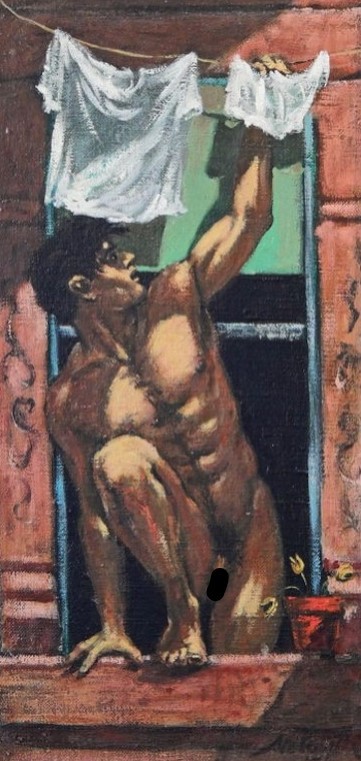
Summer Morning
Melcarth was born Edward Epstein to Jewish parents in Louisville in 1914. After his father died, his mother, whose family discouraged her from becoming an opera singer, remarried a wealthy British aristocrat. Edward, who would reject religion and change his surname to that of an ancient Phoenician god, was educated in London and at Harvard University; later he studied art in Boston with the German-born painter Karl Zerbe.
The gay, Kentucky-born artist Henry Faulkner, the photographer Thomas Painter, and Melcarth lived together in New York for some time during the decades following WWII. They shared friends, artistic interests — and sexual partners, too.
Painter was one of the research subjects who provided testimonials about his own and his homosexual associates’ sexual activities to the pioneering sexologist Alfred Kinsey. His reports were detailed, and from them we learn that Melcarth's appetite for sex was rapacious.
In the late 1960s, Melcarth left New York and settled in Venice, where he focused on making sculpture and died in 1973. At some point during his New York years, he had met Malcolm Forbes, who became a regular collector-patron and, after Melcarth’s death, acquired a large quantity of his works, and has been the source of many expositions of Melcarth's art.


1948 – Paul Jabara (d.1992) was an American actor, singer, and songwriter of Lebanese ancestry.
Paul wrote Donna Summer's "Last Dance" from Thank God It's Friday (1978) and Barbra Streisand's song "The Main Event/Fight" from The Main Event (1979). He cowrote the Weather Girls hit, "It's Raining Men" with Paul Shaffer.
Jabara was in the original cast of the stage musicals Hair and Jesus Christ Superstar. He took over the role of Frank-N-Furter in the Los Angeles Production of The Rocky Horror Show when Tim Curry left the production to film the movie version in England. He appeared in John Schlesinger's 1975 film, "The Day of the Locust", where he sang the production number "Hot Voo-Doo"
In 1979, Jabara won both Grammy Award for Best R&B Song and the Academy Award for Best Original Song for the song performed by Donna Summer, "Last Dance". Jabara's album Paul Jabara & Friends, released in 1983, features guest vocals by a then-20 year old Whitney Houston. It also includes the song "It's Raining Men". That song was later re-recorded several years later by drag supermodel RuPaul and Martha Wash. Wash sang on the original recording as part of the group the Weather Girls.

Jabara co-founded the Red Ribbon Project in 1991, and is credited with conceiving and distributing the first AIDS Red Ribbon.
Paul Jabara died of AIDS in Los Angeles at the age of 44 on September 29, 1992.


1952 – Brad Gooch is an American writer.
Born and raised in Kingston, Pennsylvania, he graduated from Columbia University with a bachelors in 1973 and a doctorate in 1986.
Gooch is currently a Professor of English at William Paterson University in New Jersey. He has lived in New York City since 1971. His 2015 memoir Smash Cut recounts life in 1970s and 1980s New York City, including the time Gooch spent as a fashion model, life with his then-boyfriend filmmaker Howard Brookner, living in the famous Chelsea Hotel and the first decade of the AIDS crisis.
Gooch is married to writer and religious activist Paul Raushenbush; they have one child.

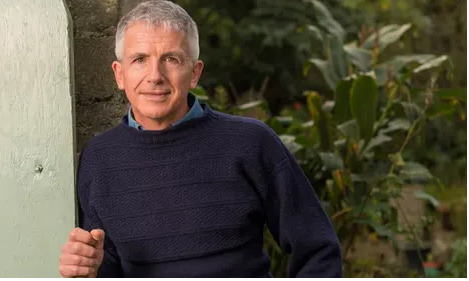
1962 – Patrick Gale is a British author, born on on the Isle of Wight, where his father was prison governor at Camp Hill, as his grandfather had been at nearby Parkhurst. The family moved to London, where his father ran Wandsworth Prison, then to Winchester. He finished his formal education with an English degree from New College, Oxford in 1983.
He has never had 'a grown-up job'. For three years he lived at a succession of addresses, from a Notting Hill bedsit to a crumbling French chateau. While working on his first novels he eked out his slender income with odd jobs: as a typist, a singing waiter, a designer's secretary, a ghost-writer for an encyclopedia of the musical and, increasingly, as a book reviewer for The Daily Telegraph.
His first two novels, The Aerodynamics of Pork and Ease were published on the same day in June 1986. The following year he moved to Camelford near the north coast of Cornwall and began a love affair with the county that has fed his work ever since.
He has written more than ten novels, a number of short stories and novellas in addition to a non-fiction book about the American novelist Armistead Maupin, with whom he has a close friendship.
He now lives in the far south-west, on a farm near Land's End with his lover, Aidan Hicks. They raise beef cattle for the open market and broccoli for Sainsbury's. His current ambition is to perfect the art of reversing a tractor and trailer around a corner.


1973 – Portia Lee James DeGeneres, known professionally as Portia de Rossi, is an Australian-American actress, model and philanthropist, known for her roles as lawyer Nelle Porter on the television series Ally McBeal and Lindsay Fünke on the sitcom Arrested Development. She also portrayed Veronica Palmer on the ABC sitcom Better Off Ted and Olivia Lord on Nip/Tuck. She is married to American stand-up comedian, television host and actress Ellen DeGeneres.
De Rossi, born Amanda Lee Rogers in Horsham, Victoria, Australia grew up in Grovedale, a suburb of Geelong, Victoria, and modelled for print and TV commercials as a child. In 1988, at the age of 15, Rogers adopted the name Portia de Rossi, by which she remains best known; in 2005, she explained that she had intended to reinvent herself, using the given name of Portia, a character from William Shakespeare's The Merchant of Venice, and an Italian last name.
De Rossi was married to documentary film-maker Mel Metcalfe from 1996 to 1999, initially part of a plan to get a green card, but she did not go through with it. She said that "it just obviously wasn't right for me". In a 2010 interview on Good Morning America, she explained that as a young actress, she was fearful of being exposed as a lesbian.
From 2000 to 2004, de Rossi dated singer Francesca Gregorini, the daughter of Barbara Bach and the stepdaughter of Ringo Starr. She said that most of her family and Ally McBeal castmates did not know she was a lesbian until tabloid pictures of the couple were published. She declined to publicly discuss the relationship or her sexual orientation at the time.
De Rossi and Gregorini broke up in late 2004 because de Rossi began dating Ellen DeGeneres, whom she met backstage at an awards show. In 2005, she opened up publicly about her sexual orientation in interviews with Details and The Advocate. She became engaged when DeGeneres proposed with a three-carat pink diamond ring. They were married at their Beverly Hills home on 16 August 2008, witnessed by their mothers and 17 other guests. On 6 August 2010, Portia filed a petition to legally change her name to Portia Lee James DeGeneres. The petition was granted on 23 September 2010. She became a US citizen in September 2011.
In 2010, de Rossi published the autobiography Unbearable Lightness which talks about the turmoil that she has experienced in her life, including suffering from anorexia nervosa and bulimia and being misdiagnosed with lupus.


1979 – Daniel Tammet is an English essayist, novelist, poet, translator, and autistic savant. His memoir, Born on a Blue Day (2006), is about his early life with Asperger syndrome and savant syndrome, and was named a "Best Book for Young Adults" in 2008 by the American Library Association's Young Adult Library Services magazine. His second book, Embracing the Wide Sky, was one of France's best-selling books of 2009. His third book, Thinking in Numbers, was published in 2012 by Hodder & Stoughton in the United Kingdom and in 2013 by Little, Brown and Company in the United States and Canada.
In 2016 he published his debut novel, Mishenka, in France and Quebec. His books have been published in over 20 languages. He was elected in 2012 to serve as a fellow of the Royal Society of Arts.
Tammet was born Daniel Paul Corney, the eldest of nine children, and raised in Barking and Dagenham, East London, England. As a young child, he suffered epileptic seizures, which remitted following medical treatment.
He participated twice in the World Memory Championships in London under his birth name, placing 11th in 1999 and 4th in 2000.
He changed his birth name by deed poll because "it didn't fit with the way he saw himself." He took the Estonian surname Tammet, which is related to "oak tree".
At age twenty-five, he was diagnosed with Asperger syndrome by Simon Baron-Cohen of the University of Cambridge Autism Research Centre. He is one of fewer than a hundred "prodigious savants" according to Darold Treffert, the world's leading researcher in the study of savant syndrome.
Tammet holds the European record for memorizing and recounting pi to 22,514 digits in just over five hours. This sponsored charity challenge was held in aid of the National Society for Epilepsy (NSE) on “Pi Day”, March 14, 2004, at the Museum of the History of Science, Oxford, UK.
He was the subject of a documentary film titled Extraordinary People: The Boy with the Incredible Brain, first broadcast on the British television station Channel 4 on 23 May 2005.
He met software engineer Neil Mitchell in 2000. They lived together as domestic partners in Kent, England, where they had a quiet life at home with their cats, preparing meals from their garden. He and Mitchell operated the online e-learning company Optimnem, where they created and published language courses.
Tammet now lives in Paris, France, with his husband Jérôme Tabet, a photographer whom he met while promoting his autobiography. Tammet is openly gay.

2017 – Thousands of gay and bisexual men who were convicted of now-abolished sexual offenses laws in Britain have been posthumously pardoned under a new policing law, the Justice Ministry announces. The law, which received Royal Assent on this day, is named after British WWII codebreaker Alan Turing, who committed suicide following his conviction for gross indecency and was posthumously pardoned by Her Majesty the Queen in 2013. It also makes it possible for living convicted gay men to seek pardons for offenses no longer on the statute book.


5 notes
·
View notes
Note
for writing prompts, I've always been a sucker for character studies, and I thought the contrast between John's very reserved routine where he was just cooped up in Kenwood vs. Paul's "king of swinging london" lifestyle post-touring years was very influential in their dynamics later on (think this was discussed in the Rob Sheffield ep. of AKOM), and dunno if it's your preferred kind of writing style - but I always loved the inner voices you gave each of them in ILTY, so would love your take on it!
inspired by you calling Paul a king instead of prince, which is the word I've seen more often :) this didn't end up being about their dynamic exactly and I went sort of off the rails in terms of style lol, but I hope you still enjoy <3
Diarchy ~1.1k words
(from Greek δι-, di-, "double", and -αρχία, -arkhía, "ruled")
“One day, you four will be bigger than Elvis,” Brian told them.
John can still recall Paul’s chuckle.
“Sir, that’s very kind of you and we are sort of brilliant, but no need for false flattery.”
Brian Epstein, immediately taken with Macca’s charm, which the leather trousers and greased hair only superficially concealed, broke into a smile.
“Believe me, I am not in the business of false flattery.” Then he locked eyes with John, with a stare so disarming it reaches across time and space and sends shivers down his spine right now, as he lies in bed, searching for motivation to get up.
Bigger than the King — every day, it’s getting harder to deny it, John realizes, as he pulls the covers up to his chin. Only, at some point, perhaps when he came face-to-face with Elvis himself, all of it – the money, the recognition, the power – became meaningless to him. Now, all he feels is the unimaginable weight of the crown, pulling him down and tightening around his brain, the burden of his medals squeezing his heart and making it ever more difficult to breathe.
Christ, does he want a cigarette right now.
Once again, his stubborn laziness has been defeated by a debilitating craving. John crawls off the king-sized mattress, so large that some nights he isn’t sure Cyn actually shares it with him. After putting on his glasses, he dons a dressing gown, which hangs off his shoulders like a royal mantle.
He is like Louis XIV, he thinks, slowly walking down the steps of Kenwood. He’s been reading a lot of history books lately, one of the only activities he still seems to enjoy, and the parallels haunt him. Here he is, in his closed-off palace, sequestered away from the capital and, whether intentionally or not, from life itself.
Here comes the Sun King, he thinks, floating into the kitchen, where Cyn sits at the table.
He is like Henry VIII, he thinks, rather off-handedly at first, simply in-keeping with the theme of over-indulgent regents — before falling into a minor spiral over what this comparison means for his current marriage.
He may have a son, but he is more and more becoming convinced that what he needs, his wife cannot provide.
He is like King Solomon, glued to his throne and writing his songs; apparently an authority on love and God even, appointed by birth, that is to say, by rotten luck. People come to him, seeking his wisdom, for they have dubbed him “the Smart One”, even whilst he spoils his sense of self, dropping acid and hallucinating three hundred concubines.
He is like Tutankhamun, the fallen Pharaoh; doomed young, buried in gold and treasure, the mask he wears remembered in lieu of his actual face.
How he longs for someone to finally open his crypt; how he fears for whomever might stumble upon it and suffer his curse.
* * *
Bigger than Jesus, Paul thinks, stepping through the gate at Cavendish Avenue. He doesn’t know why John’s misquoted words are in his head at this hour. It is so late that the street lanterns are dark and not a single fan is there to greet him.
As he comes down from the various highs of the evening – the party, the art, the coke – he finds himself contemplating the comparative.
“You’ve really gone and done it this time, haven’t you, John?” he remembers saying, his best friend half-smirking at him, in an attempt to cover up his profound fear of the disaster he had caused.
“Didn’t say ‘bigger’, did I? Wouldn’t’ve been wrong, though, if I had…”
Paul, unable to keep up his frustration for long, smiled.
“And what does that make us, then?”
John’s eyes glinted.
“Kings of King of kings.”
It’s overwhelming, Paul thinks, entering his quiet townhouse, while remembering his wild night — the celebrations may end, but the music playing in his head never does. Most moments, he is thankful for it, drinking up experiences and ideas alongside the free-flowing booze, but some dark minutes like this one, he wishes for peace; the kind he found so easily as a child, content to daydream on the back seat of a bus.
Everyone wants to speak with him now, everyone wants his consideration and stamp of approval, but the worst part: Paul wants everything, too. He’s not sure when it happened, but there is a looming sense that he’s walked past some point of no return, and he now feels a hunger inside him that will never be quelled.
Paul shakes the rain off his umbrella then hangs it up on his mahogany coat hanger, lifting it as if it were a sceptre. In the dim light, his silk shirt gleams like battle armour, like the glistening personality he has learned to put on when surrounded by crowds.
He is like King Arthur, he thinks, making his way toward the garden for one last smoke before bed; he’s been revisiting stories from his childhood as well as ones he never got around to, in an attempt to understand better. Although he tries desperately to re-distribute the reign he was bestowed with evenly across his Round Table, he will never not be the stand-out sovereign among his peers.
He draws a ciggie from his pack like the sword from the stone.
He is like Alexander the Great. He has built an empire atop another, once thought undefeatable, all before the humble age of thirty. He longs to herald in a new era of cultural sharing, and the fact he does indeed hold the power to do so is tantalizingly terrifying.
He is also plagued by a foreboding that the instant he gives in and lets himself relax, he will drop dead and with him his dominion disintegrate.
Although he tries to stop himself, Paul thinks he may be like the emperor from Andersen’s tale, clad in nothing before all his intimidated subjects. After all this time, he has never quite been able to shake the feeling that he is secretly embarrassing himself and, one day, a few words coming from the most ostensibly innocuous of sources will bring his entire kingdom down.
He is like Odysseus, King of Ithaca; so intoxicated with the thrill of adventure that he may never find his way home, all the while watching those around him give in to their fleeting desires or the whims of wily tricksters, only to pay the ultimate price.
And when it’s been this long, who at home might still be waiting for him to return? Who will grieve?
#<333333#sorry I feel like I kind of didnt fully hit the mark on your prompt I just got really Really into this motif lol#anyways please do let me know what you think :)#fic#ask#anon#fiona.docx
25 notes
·
View notes
Text
Major Powers of the Solar System Era
Originally written by Infamous Empire
Earth Alliance: One of the most notable powers of the Solar System, The Earth Alliance, officially the Unified Earth Sphere Alliance, is a decentralized federal state made up of a number of member states which governs the Earth and its surrounding bodies. The Alliance is notable for not being entirely based upon the planet from which it takes its name, with more than half of its population residing in the Space Colonies which occupy its neighboring Lagrange Points. It is often noted that, historically, there has always been tension between the planet and the colonies, with war after war having been fought between them. The One-Year War, Bloody Valentine War, Gryps Conflict, Char’s Rebellion, all conflicts defined by the tension between Earth and its Colonies. While tensions have since cooled significantly, the Alliance still faced many internal troubles and revolts. Most notably the Mufti Attacks and the Omnic Uprising.
Today, the Alliance is a largely peaceful nation. It’s most notable societal feature being it’s renowned Hero system. Based upon the superheroics of old, heroes of Earth are trained to defend the populace from criminals, natural disasters, and, if required, military force. While often derided on other planets as “mercenaries in cosplay”, the residents of the Earth Sphere consider them national icons, worthy of the title “Hero”.
The Earth’s military, however, is noted to be in poorer shape. The military is often noted to be little more than a peacekeeping force, unfit for a protracted conflict. The Alliance’s Mobile Suits, which make up the bulk of its forces, are often criticized for being decades out of date. The Alliance Military’s most recent project is the F99 Record Breaker, an experimental Gundam-type MS designed with the best technology the modern age has to offer.
Martian Congressional Republic: The other major power in the Sol System, the MCR is a unitary parliamentary republic which governs over the planet Mars. While not as populous as the Alliance, Mars is much more technologically advanced, and has a greater hold over the Outer System colonies. The people of Mars are known for their militaristic attitude, with the navy and army often considered to be the most fierce and powerful in the Solar System. Despite these advances, Martian society is often criticized for its xenophobia and chauvinism towards the rest of humanity, as well as its focus on militarization and war over all else.
The MCR has always had an infamously antagonistic relationship with Earth, stemming from the bitterness of nationalists who blame the Earth Alliance for Mars no longer being the center of civilization in the Solar System. Such rogue elements would eventually go on to found the Settlement Defense Front, a radical political movement turned terrorist organization based around the belief that the people of Mars are superior to the rest of Humanity, and thus had the right to rule over the Solar System. The organization is led by the Vers family, descendants of the man who originally discovered Aldnoah, Solomon Epstein.
While initially a rather minor group, the SDF would gain notoriety across the Solar System during the McGillis Fareed Incident, in which the rogue Gjallarhorn officer McGillis Fareed allied with the SDF to start a system-wide war. While both McGillis and the SDF were crushed in the ensuing conflict, the Incident created a lot of tension and uncertainty among the Martian populace. The Vers Family, who had escaped consequences thanks to their political connections, used this fear to rally popular support among the populace, and become the ruling power within the MCR.
Gjallarhorn: Considered by most to be the Third Superpower of the Sol System, Gjallarhorn is not a nation in the traditional sense. The organization was founded during the Apocalypse to serve as a neutral peacekeeping force. With bases on every planet and a constant influx of recruits from every major nation, Gjallarhorn has retained its position and prestige for centuries.
However, despite technically being a neutral party, Gjallarhorn is often noted to have grown into a power in its own right. It’s leaders, an alliance of families known as the Seven Stars, used their position to accrue wealth for themselves, and a great many colonies which technically belong to Earth or Mars are often noted to be run by Gjallarhorn officials in all but name. Despite intense frustration, most minor nations and colonies couldn’t do anything about it, as Gjallarhorn maintained one of the largest militaries in the Solar System.
This status quo could not last forever, and indeed it was eventually overturned by the McGillis Fareed Incident. McGillis, the head of the Seven Stars’ Fareed Family, launched a revolt against Gjallarhorn, with dreams of overturning the corruption that had overtaken the organization. While fighting was fierce, McGillis soon found himself overwhelmed, and his revolution was crushed under Gjallarhorn’s heel.
Even so, while McGillis was defeated, his dream would end up being fulfilled nonetheless. Four of the Seven Stars had been exterminated during the conflict, and the remaining leadership were made very aware that the status quo could not be maintained. And thus, the Seven Stars system was dismantled, replaced by a democratic organization made up of representatives from every nation. Most corrupt officials were purged, and a more equal relationship was formed with the powers of the Solar System.
Despite all this reform, the organization did not disarm its massive military, and many colonies across the outer planets still often find themselves reeling under the heel of Gjallarhorn.
Outer Planets Alliance: While not usually recognized as a Major Power, especially in the Inner Planets, the Outer Planets Alliance plays a major role in the Sol System. The group, if it can even be called that, was founded in order to protest the control that Inner Planet powers such as Mars, Earth, and Gjallarhorn had over the Asteroid Belt and Outer Planets. From these humble beginnings the OPA grew into a cultural phenomenon in the outer planets, demanding full independence for the people of the outer spheres. Despite having a common goal and name, the OPA is not a nation or faction in the traditional sense, being more of a movement or network. Thus, the group’s activities and methods are defined primarily by it’s internal factions.
The most powerful and feared group within the OPA is the Jupiter Empire. Led by a mysterious man named “Callisto’s Shadow”, the Empire is officially recognized as merely being a political activist group, but in reality, the Empire is effectively a nation in it’s own right, ruling over most of the Jovian System. The Empire’s operations are largely handled under the aegis of Teiwaz, a front group which operates as a megacorporation with influence in every sector of business and a near monopoly on the trade routes between Jupiter, Mars, and Earth. The Empire is often criticized even within the OPA for its overt fascism and social darwinist philosophy, with even the most abundant resources being heavily rationed as a way of culling “the weak.” The Empire is also noted for its expansionist goals and antagonistic attitude, with the Empire’s goal being the conquest of the Inner Planets, which the people view as paradise due to resources being freely available. The Empire’s projects have been opposed and stopped, however, by the mysterious paramilitary force known as the Crossbone Vanguard.
The other most notable faction within the Outer Planets Alliance is the Tycho Station branch of the OPA. Based out of the Tycho Construction Station, this OPA, led by the outspoken former Earth Alliance soldier Fred Johnson, is often noted for its more benevolent approach towards belter independence, seeking diplomacy and recognition from the Superpowers rather than conflict and subterfuge. Because of this, Fred’s OPA is the most mainstream and visible of the OPA’s factions, and is often what most people refer to when they mention the organization. However, Fred’s OPA is fraught with conflict with other branches, the Jupiter Empire in particular has denounced them as spineless weaklings, and many of the more violent splinter cells have fallen outside of Fred’s influence, such as the forces of Anderson Dawes. Nevertheless, the organization continues to advocate for the independence of the belt.
#grand crossover worldbuilding#fanfic#mobile suit gundam#the expanse#my hero academia#overwatch#aldnoah.zero#call of duty
2 notes
·
View notes
Text
Memory’s Legion: Drive part 1
Ah, we’re really early in the timeline, and things are happening way before the start of the books themselves, visiting something that was a throw-away line in the first book:
Then Solomon Epstein had built his little modified fusion drive, popped it on the back of his three-man yacht, and turned it on. With a good scope, you could still see his ship going at a marginal percentage of the speed of light, heading out into the big empty. The best, longest funeral in the history of mankind.
So, you know where the story is going, just as it starts. Solomon is going to die on that ship, and but his technology will be used to get humanity access to more places in the space. I think we even get the reason he’ll do it, considering the awkward political situation Mars is in.
But most of the story is taken up by Solomon meeting what I’m assuming is either his romantic or research partner. The person he tries to call when he needs someone to bail him out. And that makes sense, a character doing fictional research isn’t that interesting or relatable, and meeting an attractive stranger at the bar is.
Comparing Mars to America makes sense, for the reasons Solomon did, but it still feels very marked because this book definitely assumes the reader is an American too. Like it might give too much leeway to one side of the conflict, because they are the America of space and Americans have a bad habit of American exceptionalism.
0 notes
Text
0 notes
Photo

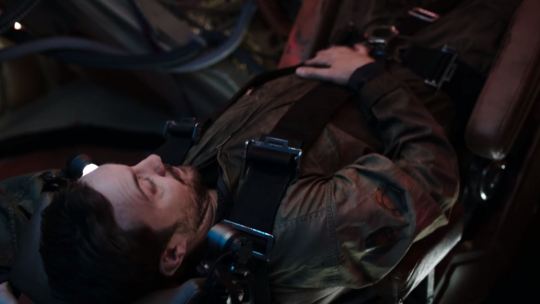




Solomon Epstein, The Expanse, Season 2, Episode 6
#TheExpanse#The Expanse#SolomonEpstein#Solomon Epstein#SamHuntington#Sam Huntington#Season 2#Mars Fashion
6 notes
·
View notes
Text
After finishing Leviathan Wakes I went back to read the 3 prequel novellas. When I first tried to tackle reading The Expanse I tried to read everything chronologically and it didn’t work well for me, so I think I should stress that those additional novellas are just that - additional. They are supplementary material to the main story, not something crucial without which you will never understand fully the books. This isn’t some big franchise bs with “everything is canon and extremely important so you need to buy, read, consume every little thing we put out”. Those novellas are canon, but you can read them whenever you want and I actually recommend reading them after the best part, that is the main story. That worked out better for me.
1. The Drive - the novella set far back in time is the story of Solomon Epstein, the engineer and creator of the Epstein drives which allowed humanity to fly fast enough to colonize the Belt. It also gives us a look into Mars’ road towards independence from Earth. I found this one enjoyable, tragic but lighthearted and even uplifting. Worth a read.
2. The Butcher of the Anderson Station - this is the personal story of Fred Johnson, what happened on the Anderson Station that gave him the reputation and how he fell in with the OPA. Also, Anderson Dawes gets some more spotlight and I wonder if his story about the sister was true. Despite getting the big part of this story from the show, the novella gave a different, more in-depth perspective on Fred and who he is, what his job and role was in taking the station, why he joined Belters. I definitely enjoyed this one. Just seeing Fred so angry, belligerent, even suicidal as he looks for a way to get into a fight and get offed was a treat. We can better appreciate his calm in Leviathan Wakes. Fred really came a long way from a colonel, a cog in the machine really, just doing his job and following orders, to this Fred the politician, the man that has power and resources to make the big decisions. But I find it fun how in both settings he was still coordinating others, that didn’t change. There is a refreshing parallel between his taking of Anderson Station and Thoth Station. Anyway, this one is also recommended.
3. The Churn - this is the backstory of Amos and how he even got the name and left Earth. Basically what happened in Baltimore. The show gave some hints, so I had some idea about his past, so I looked forward to getting the details, however what I got in this novella was not what I expected and not in a good way. It’s the longest out of the three stories and it’s also the dullest. It’s not a character study of Amos. I can agree that it is the origin of his, but it’s still very much incomplete. I still don’t know what made him who he is, because the Amos or Timmy from the novella seems exactly the same as the Amos from the books. I doubt we will ever get any real answer about him, so I guess he’s just screwed like that and that’s it. The accompanying characters gave him the second chance and there’s some bond and symbolism in it, especially with Lydia, but ultimately Amos is so unfeeling that he leaves them without a second thought and probably never concerns himself with them again. What a “fascinating” observation about his nature. Alright, I admit, I was never a big fan of him, I enjoy his character and he’s got amazing moments on the show, but he’s not a favourite of mine. The other con of the novella for me was the climate.. It’s pretty much a mob story, populated by indifferent, jaded, amoral, screwed up characters that I really have no sympathy or feeling for. The climate of the story is drenched in decay of drowning Baltimore and the all-permeating sense of hopelessness. It’s grimy, dirty and unpleasant all around. Adding that to the underwhelming Amos origin, I’m questioning the point of it all. Not recommended, read if you love Amos or are completionist that needs to read everything in the series to achieve satisfaction like myself.
3 notes
·
View notes
Photo
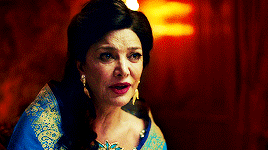







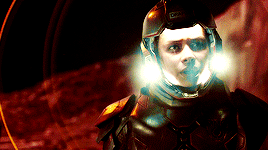

The Expanse S02E06 - Paradigm Shift
That's the wonderful and terrible thing about technology. It changes everything.
#the expanse#theexpanseedit#alex kamal#bobbie draper#amos burton#paolo cortazar#camina drummer#naomi nagata#james holden#solomon epstein#chrisjen avasarala#diogo harari#the expanse gif#gif#the expanse syfy#mine#mineexpanse#i hate coloring this show damn
430 notes
·
View notes
Video
youtube
Hannity: Explosive! Jeffrey Epstein, Prince Randy coverup and more
#ambassador#biden#BRF threats#Burisma holdings#hannity#hunter biden#jeffrey epstein#John Solomon#kate#obama#pay off#Prince Andrew#quid pro quo#shake down#ukraine#will
2 notes
·
View notes
Text
ummm dont talk to me unless youve read
Effeminate England: Homosexual Writing After 1885 by Joseph Bristow; Secret Selves: Confession and Same-Sex Desire in Victorian Autobiography by Oliver Buckton; Sacred and Profane in Symbolist at the Art by Luigi Carluccio; Virtuous Vice: Homoeroticism and the Public Sphere by Eric Clarke; Nameless Offences: Homosexual Desire in the Nineteenth Century by H. G. Cocks; Talk on the Wilde Side by Cohen; An Introduction to Logic and Scientific Method by Morris R. Cohen, Ernest Nagel; Sex Scandals: The Private Parts of Victorian Fiction by William Cohen; London and the Culture of Homosexuality, 1885–1914 by Matt Cooke; Family Likeness: Sex, Marriage, and Incest from Jane Austen to Virginia Woolf by Mary Jean Corbett; American Sympathy: Men, Friendship and Literature in the New Nation by Caleb Crain; Emulation: Making Artists for Revolutionary France by Thomas Crow; Love Revealed: Simeon Solomon and the Pre-Raphaelites by Colin Cruise; Queer Beauty: Sexuality and Aesthetics from Wincklemann to Freud and Beyond by Whitney Davis; Friendship's Bonds: Democracy and the Novel in Victorian England by Richard Dellamora; Masculine Desire: The Sexual Politics of Victorian Aestheticism by Richard Dellamora; "Beautiful, Aesthetic, Erotic." The New York Review of Books by Richard Dorment; Romantic Genius: The Pre-History of a Homosexual Role by Andrew Elfenbein; British Aestheticism and Ancient Greece: Hellenism, Reception, Gods in Exile by Stefano Evangelista; The Trials of Oscar Wilde: Deviance, Morality, and Late-Victorian Society by Michael S. Foldy; The History of Sexuality: An Introduction (Volume I) by Michel Foucault; Queer Dickens: Erotics, Families, Masculinities by Holly Furneaux; Idylls of the Marketplace: Oscar Wilde and the Victorian Public by Regenia Gagnier; Selected Poetry by Johann Wolfgang Goethe, David Luke; The Story of Art by E. H. Gombrich; Queer Others in Victorian Gothic: Transgressing Monstrosity by Ardel Haefele-Thomas; Homosexual Desire by Guy Hocquenhem; "Burne-Jones and Gustave Moreau." Horizon: A Review of Literature and Art by Robin Ironside; The Homosexual Revival of Renaissance Style, 1850–1950 by Yvonne Ivory; The Symbolists by Philippe Jullian; Observations on the Feeling of the Beautiful and Sublime by Immanuel Kant, John T. Goldthwait; Sexual Justice: Democratic Citizenship and the Politics of Desire by Morris B Kaplan; Sodom on the Thames: Sex, Love, and Scandal in Wilde Times by Morris B Kaplan; Painted Men in Britain, 1868–1918: Royal Academicians and Masculinities by Jongwoo Jeremy Kim; Between Women: Friendship, Desire, and Marriage in Victorian England by Sharon Marcus; The Other Victorians: A Study of Sexuality and Pornography in Mid-Century Britain by Steven Marcus; Pleasures Taken: Performances of Sexuality and Loss in Victorian Photographs by Carol Mavor; The Last Pre-Raphaelite: Edward Burne-Jones and the Victorian Imagination by Fiona MacCarthy; "The Homosexual Role." Social Problems 16.2 by Mary McIntosh; Victorian Keats: Manliness, Sexuality, and Desire by James Najarian; Walking the Victorian Streets by Deborah Epstein Nord; Catholicism, Sexual Deviance, and Victorian Gothic Culture by Patrick O'Malley; The Place of Enchantment: British Occultism and the Culture of the Modern by Alex Owen; The Renaissance by Walter Pater; Flesh and the Ideal: Winckelmann and the Origins of Art History by Alex Potts; Art for Art Sake's: Aestheticism in Victorian Painting by Elizabeth Prettejohn; Art of the Pre-Raphaelites by Elizabeth Prettejohn; Beauty and Art: 1750–2000 by Elizabeth Prettejohn; Beauty's Body: Femininity and Representation in Victorian Aestheticism by Kathy Alexis Psomiades; Art and Homosexuality: A History of Ideas by Christopher Reed; From Realism to Symbolism: Whistler and His World by Allen Reff, Staley Theodore; Men in Wonderland: The Lost Girlhood of the Victorian Gentleman by Catherine Robson; Edward Carpenter by Sheila Rowbotham; Between Men: English Literature and Male Homosocial Desire by Eve Kosofsky Sedgwick; The Epistemology of the Closet by Eve Kosofsky Sedgwick; Sexual Anarchy: Gender and Culture at the Fin de Siècle by Elaine Showalter; The Wilde Century: Effeminacy, Oscar Wilde, and the Queer Moment by Alan Sinfield; Aubrey Breadsley: Dandy of the Grotesque by Chris Snodgrass; Postal Pleasures: Sex, Scandal, and Victorian Letters by Kate Thomas; Cities of Dreadful Delight: Narratives of Sexual Danger in Late-Victorian London by Judith Walkowitz; "Queer and Then?." Chronicle of Higher Education by Michael Warner
68 notes
·
View notes
Text
March TBR--

The month of March is actually going to be a little more intense than I originally intended because--as I won’t stop talking about--my world got kind of thrown for a loop in January and I had some real world stuff to deal with which meant my reading got put on the back burner. In March, I’ll be reading two new releases I was planning on reading in February as well as the books I originally intended on reading in March.
1. Lumberjanes Vol. 12: Jackalope Springs Eternal by Shannon Watters-- I’m sure if you’ve been around my blog for any length of time you probably already know what this series is about. We follow a group of girls at Miss Qiunzilla Thiskwin Penniquiqul Thistle Crumpet’s camp for hard-core lady-types. In each volume we see them face another fantastical creature. In this one, the jackalope.
2. Giant Days Vol. 11 by John Allison-- I’m also sure people around me already know about this comic series. Giant Days follows a group of friends at university in a slice of life style comic. We start with meeting Daisy, Susan and Esther and follow along their time at school. This one is the start of their final year.
3. House of Sky and Breath by Sarah J. Maas (Crescent City #2; New Release)-- As this is the second book in a series, I’ll try to keep this brief. Bryce Quinlan and Hunt Athalar want time to recover from the events from book one, but a band of rebels in their city pull the reluctant pair into their plans.
4. This Woven Kingdom by Tahereh Mafi (This Woven Kingdom #1; New Release)-- With this book, I’m attempting to give Tahereh Mafi another chance. I read the original Shatter Me trilogy and had a real bad time so I’m hoping things improve with a new series. This one features clashing empires, forbidden romance, and a long-forgotten queen destined to save her people, inspired by Persian mythology. Where’s the “Stop He’s Dead Already” meme but with “Stop She’s Already Hooked.”
5. Howl’s Moving Castle by Diana Wynne Jones (Howl’s Moving Castle #1)-- This is a book from the 40 books before 40 list I made last year and I’m excited to read it. I know this is well loved so I will try to avoid butchering this description. Sophie unwittingly attracts the ire of the Witch of the Waste which leads her on an adventure to get help from the Wizard Howl at his castle.
6. The Last Laugh by Mindy McGinnis (The Initial Insult #2; New Release)-- The final book in a duology, The Last Laugh is based on the works of Edgar Allan Poe and given an even darker and more sinister twist. In book one, we learn the mystery of the disappearance of Tress Montor’s parents. In book two, we must deal with the fall out.
7. This May End Badly by Samantha Markum (NetGalley)-- This book has a lot going for it which is why I accepted an ARC of it earlier this year. We have a prank war between two rival schools, Winfield Academy and The Weston School, as well as a fake dating trope. The pranks--and emotions--escalate as time goes on, but when something sinister comes out everyone must decide what’s more important: winning a rivalry or joining forces to protect something far more critical than a prank war legacy.
8. Drive by James S.A. Corey (The Expanse #2.6)-- The Expanse series follows a cast of characters as they continue space exploration and deal with space wars from different arms of the human race. This story is a prequel that takes place approximately 150 year prior to the main series and follows Solomon Epstein and his invention of the Epstein Drive.
9. Abaddon’s Gate by James S.A. Corey (The Expanse #3)-- This is also part of the Expanse series so I won’t explain the synopsis too much. We follow Jim Holden and his crew as they explore the next great frontier for human kind: alien tech just outside the orbit of Uranus. I wish I could say more than that but this world is just too expansive (that was absolutely not on purpose but let’s pretend it was) with so many different moving parts. As a lot of people have said all over the bookish parts of the internet, this is Science Fiction as it’s meant to be done. So well crafted with amazing world building and the science is on point (at least it seems to me).
I would love to add in My Favorite Half-Night Stand by Christina Lauren because I got an e-Book of it for really cheap, but I feel like this is enough to be getting on with for now. As my TBR sits right now, my page count for the month will be 3,350 pages.
#tbr#to be read#to be read pile#bookstack#march tbr#tbr pile#bookish#booklr#bookstagram#books#40 books before 40#40 before 40#howl's moving castle#this woven kingdom#house of sky and breath#giant days#lumberjanes
9 notes
·
View notes
Text
22 Books in 2022
Thanks so much for the tag, @ireadiguess! Here are 22 books I want to read in 2022:
The Unidentified by Colin Dickey- I WILL read this because I have it checked out from the library right now. Really enjoyed Ghostland (possibly my favorite nonfiction from last year?), so I’m excited for this one.
Daughters of Sparta by Claire Heywood- I SHOULD read this because it’s in my physical tbr stack. Nervous about this one because classical myth retellings have become very trendy lately and not to be an academic classicist but that does set off some warning bells. But I definitely want to give it a chance!
Vespertine by Margaret Rogerson- I really, really liked Sorcery of Thorns, so I’m hoping I’ll like Rogerson’s next read just as much.
Cloud Cuckoo Land by Anthony Doerr- I believe @ninja-muse liked this one and it sounds like it’s about narratives and interconnected stories and has a connection to the ancient world, which is always exciting.
A Master of Djinn by P. Djèlí Clark- Fantastical murder mystery, need I say more?
Bloodmarked by Tracy Deonn- Legendborn was so good! I need more!
This is How You Lose the Time War by Max Gladstone and Amal El-Mohtar- Got this for Christmas so I WILL read it. (Even if I have to steal it back from my friend first.) Have heard many good things.
The Strange Case of the Alchemist’s Daughter by Theodora Goss- This one has been on my radar forever. Perhaps this is the year.
We Free the Stars by Hafsah Faizal- It’s been so long since I’ve read the first one but it was quite good so I would like to finally get my hands on the second one.
Disfigured: On Fairytales, Disability, and Making Space by Amanda Leduc- Seems like an important perspective for me to consider, as someone who reads a lot of fairytales!
Robert Harris’ Cicero trilogy- We read just the second book of this (?) for my high school Latin class and I’m looking forward to reading them all and seeing how they hold up. (Also, now owned so should be able to do this.)
The Haunting Season by an assortment of authors- Got really into the idea of Victorian Christmas ghost stories this year (?) so I want to pick up this little collection riffing on that theme.
The Wolf Den by Elodie Harper- Prostitutes in Pompeii. Could go very well. Could go terribly. Only time will tell. (If I can get my hands on this book.)
A Marvellous Light by Freya Marske- This just came highly recommended also by @ninja-muse.
The Turn of the Screw by Henry James- This has been on my tbr list for some time and I feel like I should include at least one classic.
A Winter’s Promise by Christelle Dabos (translated by Hildegarde Serle)- A friend read this quartet this year and loved them, so hoping to get to this.
The Spectral Arctic by Shane McCorristine- Can you tell that I’m doing some research on ghosts this semester?
White is for Witching by Helen Oyeyemi- See above.
Home by Toni Morrison- I believe if I read this one I’ll have read all 11 of Toni Morrison’s novels! (Though I suspect Song of Solomon will remain my favorite.)
A Natural History of Dragons by Marie Brennan- Another one that’s been on my tbr forever.
Caroline Alexander’s translation of the Iliad- It’s been too long since I’ve actually read the whole Iliad, frankly.
A Tip for the Hangman by Allison Epstein- Tudor England, spies, I’m here for it.
Not many upcoming releases on there because I’m bad at keeping track of that kind of stuff, but I’m sure I’ll find some of those too.
Tagging anyone who would like to join because most of the people I would tag have already done it!
8 notes
·
View notes
